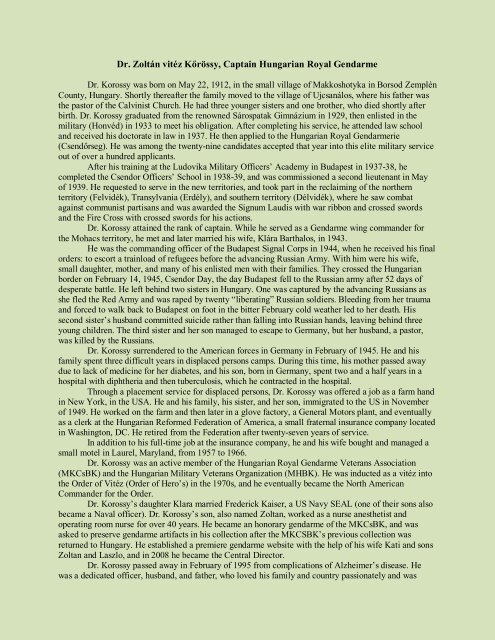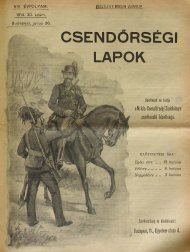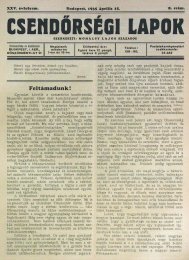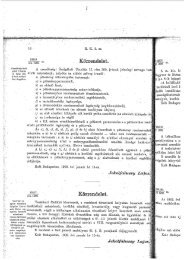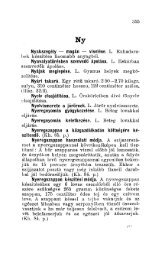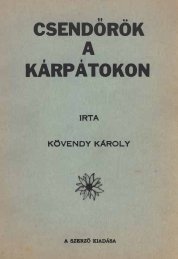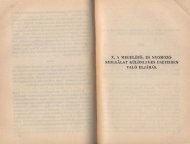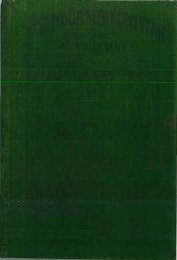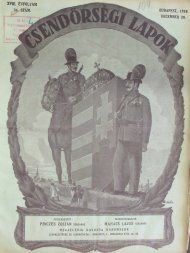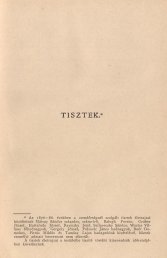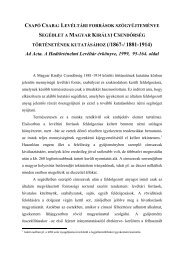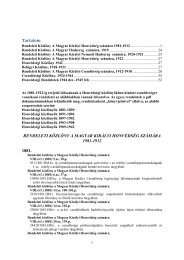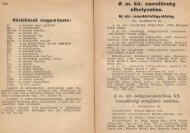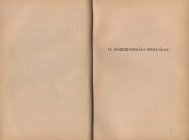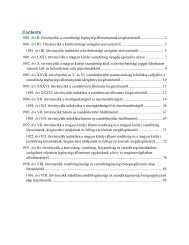Körössy Zoltán százados.pdf - Magyar Királyi Csendőrség
Körössy Zoltán százados.pdf - Magyar Királyi Csendőrség
Körössy Zoltán százados.pdf - Magyar Királyi Csendőrség
Create successful ePaper yourself
Turn your PDF publications into a flip-book with our unique Google optimized e-Paper software.
Dr. <strong>Zoltán</strong> vitéz Kőrössy, Captain Hungarian Royal Gendarme<br />
Dr. Korossy was born on May 22, 1912, in the small village of Makkoshotyka in Borsod Zemplén<br />
County, Hungary. Shortly thereafter the family moved to the village of Ujcsanálos, where his father was<br />
the pastor of the Calvinist Church. He had three younger sisters and one brother, who died shortly after<br />
birth. Dr. Korossy graduated from the renowned Sárospatak Gimnázium in 1929, then enlisted in the<br />
military (Honvéd) in 1933 to meet his obligation. After completing his service, he attended law school<br />
and received his doctorate in law in 1937. He then applied to the Hungarian Royal Gendarmerie<br />
(Csendőrseg). He was among the twenty-nine candidates accepted that year into this elite military service<br />
out of over a hundred applicants.<br />
After his training at the Ludovika Military Officers’ Academy in Budapest in 1937-38, he<br />
completed the Csendor Officers’ School in 1938-39, and was commissioned a second lieutenant in May<br />
of 1939. He requested to serve in the new territories, and took part in the reclaiming of the northern<br />
territory (Felvidék), Transylvania (Erdély), and southern territory (Délvidék), where he saw combat<br />
against communist partisans and was awarded the Signum Laudis with war ribbon and crossed swords<br />
and the Fire Cross with crossed swords for his actions.<br />
Dr. Korossy attained the rank of captain. While he served as a Gendarme wing commander for<br />
the Mohacs territory, he met and later married his wife, Klára Barthalos, in 1943.<br />
He was the commanding officer of the Budapest Signal Corps in 1944, when he received his final<br />
orders: to escort a trainload of refugees before the advancing Russian Army. With him were his wife,<br />
small daughter, mother, and many of his enlisted men with their families. They crossed the Hungarian<br />
border on February 14, 1945, Csendor Day, the day Budapest fell to the Russian army after 52 days of<br />
desperate battle. He left behind two sisters in Hungary. One was captured by the advancing Russians as<br />
she fled the Red Army and was raped by twenty “liberating” Russian soldiers. Bleeding from her trauma<br />
and forced to walk back to Budapest on foot in the bitter February cold weather led to her death. His<br />
second sister’s husband committed suicide rather than falling into Russian hands, leaving behind three<br />
young children. The third sister and her son managed to escape to Germany, but her husband, a pastor,<br />
was killed by the Russians.<br />
Dr. Korossy surrendered to the American forces in Germany in February of 1945. He and his<br />
family spent three difficult years in displaced persons camps. During this time, his mother passed away<br />
due to lack of medicine for her diabetes, and his son, born in Germany, spent two and a half years in a<br />
hospital with diphtheria and then tuberculosis, which he contracted in the hospital.<br />
Through a placement service for displaced persons, Dr. Korossy was offered a job as a farm hand<br />
in New York, in the USA. He and his family, his sister, and her son, immigrated to the US in November<br />
of 1949. He worked on the farm and then later in a glove factory, a General Motors plant, and eventually<br />
as a clerk at the Hungarian Reformed Federation of America, a small fraternal insurance company located<br />
in Washington, DC. He retired from the Federation after twenty-seven years of service.<br />
In addition to his full-time job at the insurance company, he and his wife bought and managed a<br />
small motel in Laurel, Maryland, from 1957 to 1966.<br />
Dr. Korossy was an active member of the Hungarian Royal Gendarme Veterans Association<br />
(MKCsBK) and the Hungarian Military Veterans Organization (MHBK). He was inducted as a vitéz into<br />
the Order of Vitéz (Order of Hero’s) in the 1970s, and he eventually became the North American<br />
Commander for the Order.<br />
Dr. Korossy’s daughter Klara married Frederick Kaiser, a US Navy SEAL (one of their sons also<br />
became a Naval officer). Dr. Korossy’s son, also named Zoltan, worked as a nurse anesthetist and<br />
operating room nurse for over 40 years. He became an honorary gendarme of the MKCsBK, and was<br />
asked to preserve gendarme artifacts in his collection after the MKCSBK’s previous collection was<br />
returned to Hungary. He established a premiere gendarme website with the help of his wife Kati and sons<br />
Zoltan and Laszlo, and in 2008 he became the Central Director.<br />
Dr. Korossy passed away in February of 1995 from complications of Alzheimer’s disease. He<br />
was a dedicated officer, husband, and father, who loved his family and country passionately and was


